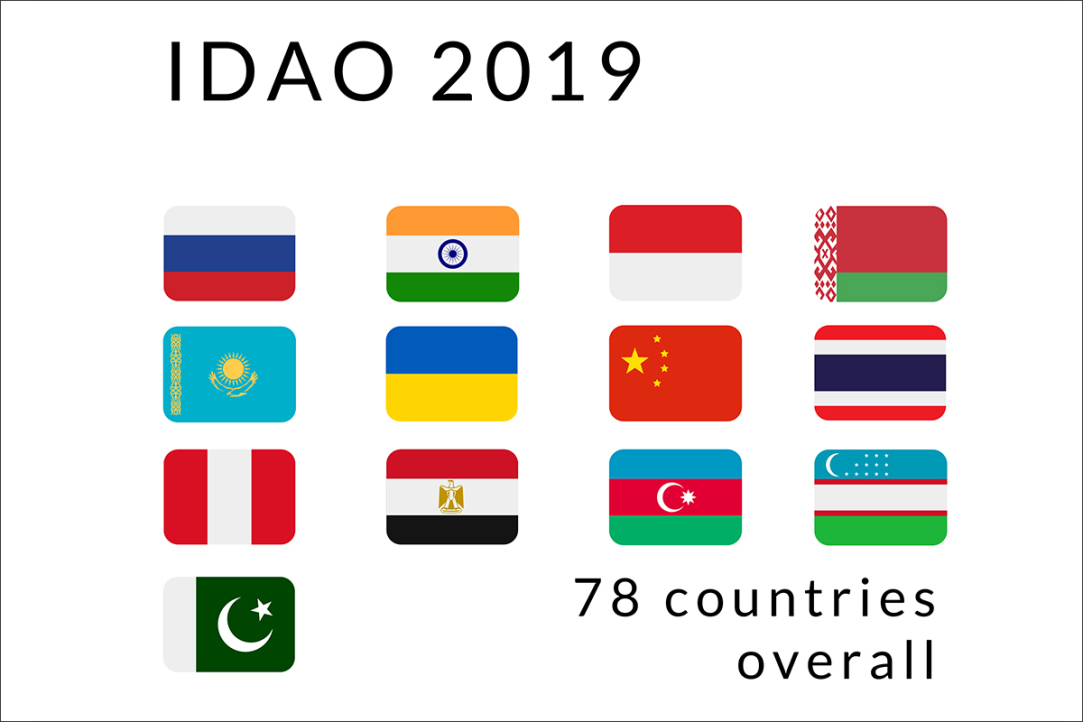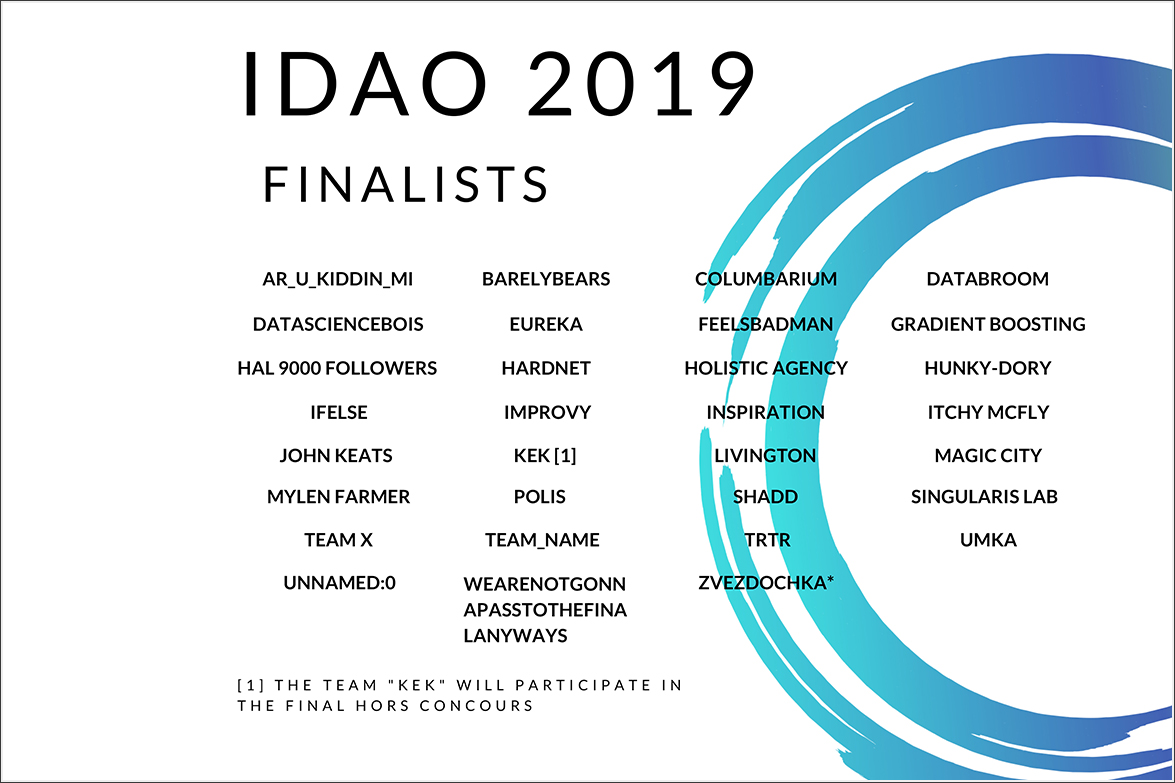31 Teams from Seven Countries Make It to IDAO Finals

On February 18, the online round of the International Data Analysis Olympiad (IDAO) officially finished. The Data analysis competition is organized by the HSE Faculty of Computer Science and Yandex with the support of Sberbank. This year 1287 teams from 78 countries took part in the online round.
IDAO was conceived by leading data scientists for their future colleagues. The Olympiad is held for the second time. It brings together experienced and novice data scientists and researchers from around the world.
The online round was held on the Yandex.Contest platform from January 15 to February 11.
The muon research group of the LHCb experiment (LHCb Muon Group) provided the task for participants of the online qualifying round.

Nikita Kazeev,
co-author of the task, Research Assistant at the HSE Laboratory of Methods for Big Data Analysis
‘This is a problem we are working on, somewhat simplified. The participants were asked to build an algorithm that distinguishes muons from the rest of the particles using the information from the Muon subdetector.
Basically, we do not know what makes up the bigger part of the Universe, the part we call “dark matter” and “dark energy”. To study it, we create conditions similar to what the world was moments after the Big Bang. This is done with particle accelerators, where we use the results of particle collisions to study the fundamental laws governing them. Using a very rough analogy, we collide automobiles at supersonic speed, take pictures of the crash debris, and then use those pictures to understand how an engine works. One such “photo camera” is the LHCb detector.
In order to collect enough data to analyze rare processes, approximately 30 million proton-proton collisions occur per second in the LHCb. After the upgrade of the collider in 2021, this number will increase by 5-10 times. Under the severe constraints on computing resources, we must quickly select the small number of collisions that are interesting for further analysis. One of the signs is the presence of muons among the products.’

As part of the online round, participants could try their hand at two separate tracks with different restrictions on the form of the final decision.
The first track was a classic data science competition. According to the labeled set of training data, participants were asked to classify test data using labeled training set. In this track, participants could build arbitrarily complex models. However, in real-world problems, efficiency is just as important as quality. That is why for success in the second competitive track, it was necessary to successfully solve the same problem, but taking into account strict and realistic time and memory constraints of the trained forecasting program.

Andrey Ustyuzhanin,
Head of the Laboratory of Methods for Big Data Analysis at the HSE Faculty of Computer Science, member of the IDAO jury
‘The task of the first stage is a complicated interdisciplinary task of applying machine learning methods for particle physics. The difference from the standard application is that the participants could improve the quality by not only creating features, but also change the training method itself to take into account additional information about the inaccuracy of label assignment. The participants sent several solutions with interesting approaches.’
Following the results of the first stage, 31 best teams will take part in the final, which will be held in Moscow from April 4 to April 6 in the office of Yandex, whose representatives have prepared the task for the final stage. The participants of these teams represent Russia, Belarus, Kazakhstan, India, Japan, Azerbaijan and Swaziland.
As a part of the offline round, speeches and master classes of international machine learning and data analysis experts are also scheduled.
IDAO winners will receive valuable prizes, and the results of the Olympiad will be a serious advantage for students applying to the master’s degree programs at the HSE Faculty of Computer Science.
Nikita Kazeev
Research Assistant at the HSE Laboratory of Methods for Big Data Analysis
Andrey Ustyuzhanin
Associate Professor at the Faculty of Computer Science
See also:
HSE University and Yandex Education Release Free Online Handbook in Math and Data Analysis
Experts from the HSE Continuing Education Centre, the Master's Programme 'Artificial Intelligence', and Yandex Education have developed and published a free math handbook in data analysis (in Russian). This is the seventh online publication in a series of digital self-study textbooks dedicated to specific IT areas.
‘Bots Are Simply Imitators, not Artists’: How to Distinguish Artificial Intellect from a Real Author
Today, text bots like ChatGPT are doing many tasks that were originally human work. In our place, they can rewrite ‘War and Peace’ in a Shakespearean style, write a thesis on Ancient Mesopotamia, or create a Valentine’s Day card. But is there any way to identify an AI-generated text and distinguish it from works done by a human being? Can we catch out a robot? The Deputy Head of the HSE School of Data Analysis and Artificial Intelligence, Professor of the HSE Faculty of Computer Science Vasilii Gromov explained the answer in his lecture ‘Catch out a Bot, or the Large-Scale Structure of Natural Intelligence’ for Znanie intellectual society.
HSE and Indian Institute of Technology Delhi Agree on Joint Research Projects
HSE University-St Petersburg and the Indian Institute of Technology Delhi (IIT Delhi), a leading Indian university, have agreed to launch joint research projects in the field of social, political studies, humanities, and data analysis for master's students. On the Russian side, this work will be coordinated by the HSE St Petersburg School of Social Sciences.
Master's Programme in 'Data Science' Accredited by AI Alliance Russia
Based on the assessment results, the programme's strengths were identified as its broad coverage of educational disciplines, in-depth exploration of theoretical aspects in machine learning, the quality of staff, and the involvement of potential employers. This is the fifth educational programme at the HSE Faculty of Computer Science to receive this prestigious professional and public accreditation.
At Sarov Technopark, Researchers from HSE Faculty of Computer Science Discussed AI for Data Analysis in Physics
The Laboratory of Methods for Data Analysis of the HSE Faculty of Computer Science, in collaboration with the All-Russian Research Institute of Experimental Physics (RFNC-VNIIEF, Sarov) and the National Centre for Physics and Mathematics, recently held the Second All-Russian School-Seminar on High Energy Physics and Accelerator Technology.
HSE University and Samolet to Train Data Analysts in Development
HSE University’s Faculty of Computer Science and Samolet, one of Russia’s largest development companies, are launching a new Master’s Programme 'Data Science for Construction, Architecture and Engineering'. Samolet will finance the tuition of the 30 best applicants on the programme.
‘Smart and Bright: Winners of Data Analysis National Olympiad Announced
The awards ceremony for the winners of the Data Analysis National Olympiad (DANO) has taken place at the HSE Cultural Centre. This is the second time the Olympiad has been held, and was organized by HSE University together with Tinkoff. About 7,000 participants from different regions of Russia and 13 other countries took part in the event. Those coming in the top 25 of the individual ratings will be able to study at HSE University for free.
Over 7,000 Students Take Part in Data Analysis National Olympiad
Data analysis enthusiasts from different regions of Russia and 13 foreign countries recently took part in the Data Analysis National Olympiad (DANO). The results of the first round will be announced on October 20th.
HSE Faculty of Computer Science Celebrates its First Graduates of the Data Science and Business Analytics Programme
At the beginning of July, the Data Science and Business Analytics programme at the HSE Faculty of Computer Science held its first graduation ceremony. Most graduates have already found jobs in various fields—Data Science, development, product management, systems analysis, and so on. Many of the bachelors plan to continue their studies at the best international and Russian universities, but they are not going to say goodbye. ‘We have been and will always be one big team,’ they say.
Bachelor's Programme in Data Science and Business Analytics Accredited by AI Alliance Russia
The ‘Data Science and Business Analytics’ bachelor’s programme at HSE Faculty of Computer Science has received professional and public accreditation by the AI Alliance Russia. This is the third programme of the faculty that has received accreditation from the AI Alliance Russia, following the bachelor's programme in ‘Applied Mathematics and Information Science’ and the master’s programme in ‘Financial Technologies and Data Analysis’.


